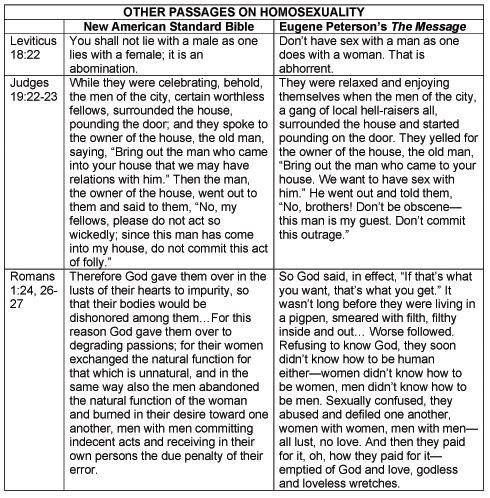Is the Message Soft on Homosexuality?
[Corrected 9:45 PM]

I read some of Eugene Peterson's The Message, and had concerns. I do not have the passage at hand, but he completely leaves out the word "homosexual" and did not replace it with a synonym. I think he said something like, "sexual sin." It's the passage from Paul, about who will inherit the kingdom. Everyone is on the bandwagon for The Message (so was I, and I hadn't even read it!). Anyway, I saw that you recommended it. Have you looked at the "redefined" passages?
Well, I have read Peterson's entire translation of the New Testament (I've almost completed the Old Testament), but I have to admit that I didn't remember how the passage described above was worded. The text referred to in the email is 1 Corinthians 6:9. Compare it to a more traditional translation side-by-side.

Two words in 1 Cor 6:9 refer to homosexuality. The word translated effeminate in the NASB is the plural of the Greek term, malakos. This is probably not the best translation of the word but it's a tricky concept to move from the Greek to English. The Greeks, like many other ancient cultures, had separate words for the passive and active homosexual partners. Malakos is actually a very interesting term. When used in non-human contexts, it means "pertaining to being soft to the touch--'soft, delicate, luxurious'" (now you get the pun in the title of this blog!). When referring to humans, it means "the passive male partner in homosexual intercourse--'homosexual.'" The second word, translated "homosexuals" in the NASB is from the word arsenokoitas. This word generally referred to the more dominant male partner of a homosexual relationship.
English translations have tried some very interesting combinations to bring these meanings across. In addition to the NASB pairing above, other options include "male prostitutes and sodomites" (NRSV), and "male prostitutes and homosexual offenders" (NIV). The English Standard Version (ESV) probably makes the best compromise possible by combining the two terms to simply "men who practice homosexuality." Regardless of how it's translated, I don't think there is any getting around Paul's original intent. And in this verse, I don't think Peterson communicates the text accurately.
Granted, Peterson is attempting to communicate in contemporary language, but the issue of homosexuality is front and center in our culture right now. And yes, this is a paraphrase, not a literal translation, but does "those who use and abuse each other, use and abuse sex" really paraphrase homosexuality?
A while back I subscribed to NavPress' newsletter regarding Peterson's paraphrase, known as "The Message Community." So I simply shot them an email and asked about this issue. Below is the response I got:
Hi there and thank you so much for your support of the Message! We have had a question similar to this before so I'll give you the information we have from our scholars on this passage.
"With regard to the issues of homosexuality, we've encountered some of the same criticisms that you have, and have actually issued a formal statement regarding those claims. I'll paste that information below. For now, here's what NavPress has said about The Message and homosexuality, particularly in reference to 1 Corinthians 6:9-11:
"Dr. Klein [Dr. William W. Klein, professor of New Testament at Denver Seminary and chairman of a committee of exegetical scholars for The Message] comments: "One could readily argue that adulterers and homosexuals 'use and abuse each other, use and abuse sex,' though of course, The Message does not employ the specific technical terms. On the other had, in this day of pedophiles and sexual harassment, et. al., the more general terms in The Message are more inclusive. God hates all kinds of sexual perversions.""
Now, that may or may not answer the question, I'm not sure but I would be happy to get more information if need be. Feel free to forward your blog friend on to me and I will do my best to get all his questions answered. Thanks for your time and again, thank you for your support of The Message!
Mindy Mills
Message Supervisor
Okay, I understand that by not using specific terms, The Message is more inclusive of all sexual sins. HOWEVER, in the original passage, Paul uses both general AND specific terms. In the quotation of 1 Cor 6:9 above, the NASB uses the very specific "fornicators." However, the NIV more accurately translates the word as "the sexually immoral." The Greek word behind both translations is the plural form of pornos which means "one who engages in sexual immorality, whether a man or a woman, and in some contexts distinguished from an adulterer or adulteress--'a sexually immoral person.'" See, pornos is an inclusive term already in the text. Paul goes out of his way to use both inclusive/general and specific terms in the passage. In my opinion Peterson has made the passage less clear.
So, let's ask the million dollar question: Is there an agenda on Peterson's part by this obscuring of homosexuality in this passage? I would prefer to give Eugene Peterson and NavPress the benefit of the doubt. Peterson has been well-known in evangelical circles for many years. His book, Long Obedience in the Same Direction is a modern-day classic. And NavPress is the publishing arm of The Navigators , an organization founded by Dawson Trotman to further evangelism and discipleship.
Maybe it's just possible that in a very well-done paraphrase, this is just a really crummy exception. Let's compare other passages in the Message and see how Peterson's paraphrase stacks up.
These passages, especially the verse in Leviticus, seem to demonstrate that Peterson has not tried to create a homosexual-friendly Bible. The phrase "sexually confused" in the Romans passage seems especially striking and would be a fairly accurate description of some of the homosexuals I personally know. But before anyone could claim that this phrase is meant to obscure the sin, Peterson spells it out who and what's involved: "women with women, men with men" and labels them "godless and loveless."
Does Peterson have a secret homosexual agenda? I don't think so. The above passages seem to indicate that his version is not overly-soft on homosexuality. However, I do believe that 1 Corinthians 6:9 in The Message is severely lacking when compared to the quality of the rest of the paraphrase and should be corrected in a future update.
In the meantime, I am going to press this issue a bit further with The Message Community, and work for just such a correction. I'll keep you informed of any developments...
*Greek references from The Greek-English Lexicon of the New Testament Based on Semantic Domains by Johannes P. Louw and Eugene A. Nida, Editors. Copyright © 1988, 1989 by the United Bible Societies, New York, NY 10023. Second Edition. Used by permission.









